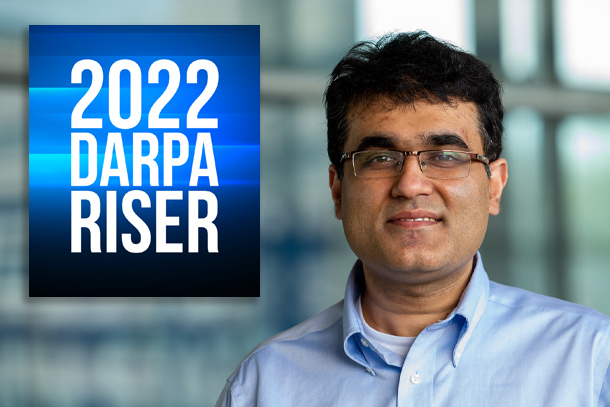
Syed Rafiul Hussain, assistant professor of computer science and engineering at Penn State, has been selected as a DARPA Riser by the U.S. Department of Defense. Credit: Kate Myers/Penn State. All Rights Reserved.
Faculty member receives grant, recognition from the U.S. Department of Defense
July 1, 2022
By Mary Fetzer
UNIVERSITY PARK, Pa. — Syed Rafiul Hussain, assistant professor of computer science and engineering at Penn State, received a two-year, $500,000 award from the U.S. Department of Defense (DOD)’s Defense Advanced Research Projects Agency (DARPA) for his work to improve the security of 5G cellular networks. The organization also recognized him by naming him a 2022 DARPA Riser.
Hussain received the DARPA Young Faculty Award, which identifies rising stars who are in the first 10 years of their careers and connects them with the DoD, according to the agency’s website. Awardees receive funding and mentoring so they may develop their research ideas in the context of national security needs.
The award will support Hussain’s efforts to develop a framework for improving the security and access control of 5G networks. According to Hussain, the extensible technologies developed in this project aim to provide DARPA with the capability to rigorously evaluate and certify the system components and software supply chain of 5G Radio Access Networks (RANs) to be deployed in mission critical operations and services, such as telemedicine on battlefields. The successful completion of this project could change the 5G security landscape by automatically uncovering and mitigating exploitable vulnerabilities to provide an effective security assurance of 5G RAN systems and potentially aid 2 billion 5G devices and more than 1,000 networks worldwide, according to Hussain.
“This project may further improve national security by protecting individuals, national infrastructures and mission critical systems from coordinated attacks carried out by nefarious parties, such as terrorist organizations and nation states, who are capable of exploiting deeply rooted logical flaws in 5G RAN systems and weaknesses in access control policies,” he said.
Hussain has also been selected as a 2022 DARPA Riser. He will travel to the Ohio State University in October to attend the DARPA Forward conference, one of six 2022 events taking place at research and development universities across the nation to connect DARPA with new communities of talent. The goal of these conferences, according to the agency’s website, is “to energize regional and national innovation ecosystems, fuel breakthroughs in national security, and help deliver the U.S. technological advantage.”
At the conference, Hussain will showcase how he has developed an approach to accurately and automatically identify critical security flaws in the 5G network design. The research has contributed to fundamental improvements of 5G security and led to changes in the design of 5G cellular standards.
“I am deeply honored and humbled to receive the recognition and the award,” Hussain said. “Participating in this program and presenting our work will give me a unique opportunity to connect with DARPA leaders and contribute to their effort to make breakthrough in national and global security.”



